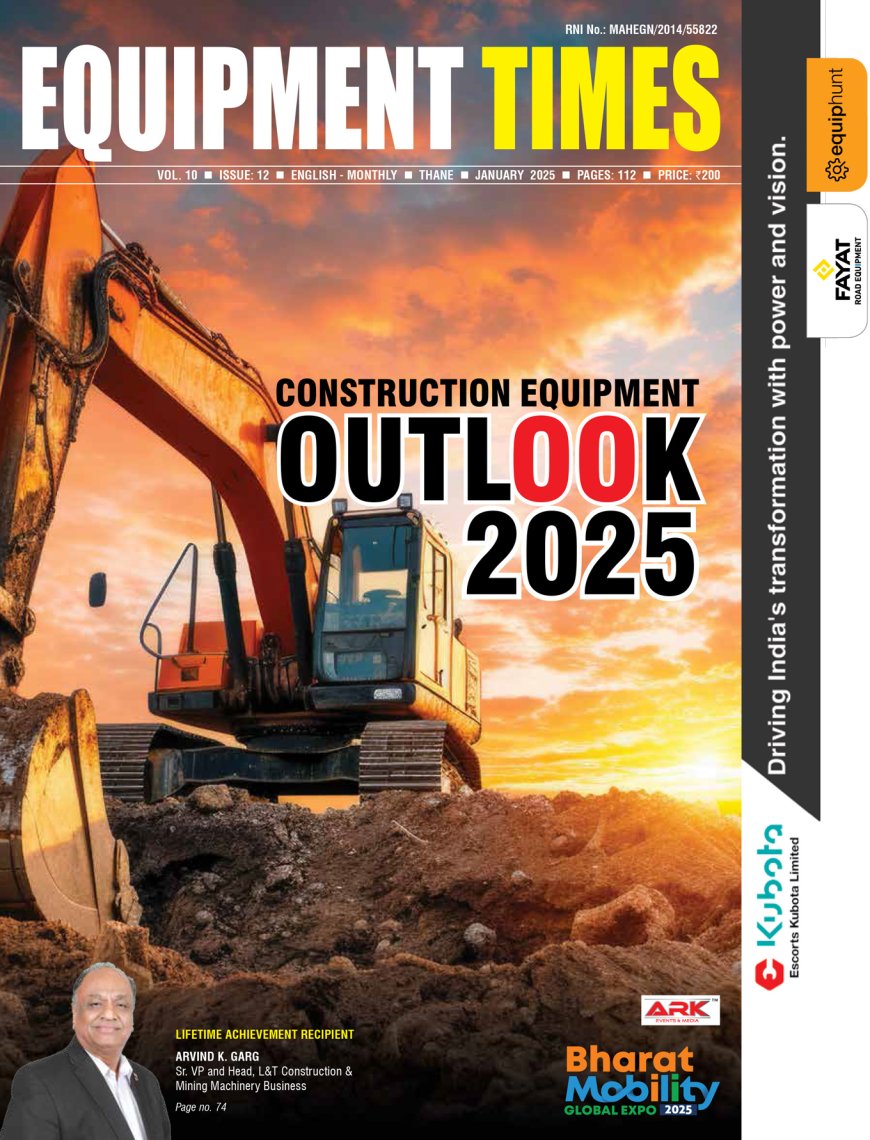We believe and see positive growth in the coming time in the road construction sector Road construction equipment industry is the backbone driving the Indian economy.
The infrastructure & construction sector has the ability to induce a multiplier effect on the economy and provide gainful employment to a large number of people. Projects in this sector propagate demand in other sectors as well such as logistics,

The infrastructure & construction sector has the ability to induce a multiplier effect on the economy and provide gainful employment to a large number of people. Projects in this sector propagate demand in other sectors as well such as logistics, cement, NBFCs etc. thus pushing the manufacturing cycle further which has a cascading effect on the entire economy. The recent announcements by the government also clearly hint towards the importance of this industry. The government has already announced several packages which will double the pace on project distribution and construction which will add to more demand generation and thus play a key role in the revival of the economy.
With exclusive emphasis on highways through accelerated highways development program by the government, how are OEMs utilising this opportunity to contribute towards the economic growth of the country?
The government’s focus on highway development has helped OEMs greatly by ensuring a strong growth in demand and business. As mentioned earlier, growth in this sector pulls up all the other sectors and also generates employment which consequently helps in the economic growth of the country. This added focus also fosters an environment of innovation and creativity which leads to better R&D, equipment designs and advanced technologies; which further leads to more efficient machines and increased productivity for the customers.
How has the Rs 20 lakh crore economic stimulus package to deal with the fallout of the Coronavirus pandemic affected OEMs?
The ₹20-lakh crores worth of economic relief, under the Atmanirbhar Bharat Abhiyan, was launched so MSME’s could sustain their businesses during the pandemic. Under this the loans provided to the MSMEs will be collateral free. This will help the OEMs in generating a local component sourcing base for the construction sector and collaborating with the MSME’s which could further lead to better R&D, infrastructure, logistics, delivery etc. and subsequently a more robust product line in the country.
At CASE, we already have a world class manufacturing plant in Pithampur, where we’ve been locally producing our construction equipment range. Products from our plant are also exported to the markets of Africa, South East Asia, Russia, Sri Lanka, Bhutan and Middle East countries.
We are hopeful that we will see these changes in India in the upcoming time and take full advantage of the policies to give products which are best in quality and technology.
What are your views on the Ministry of Road Transport and Highways (MoRTH) considering to defer implementation of BS-IV emission norms for construction equipment vehicles?
We’ve always valued the environment and believe that each and every change contributes to the betterment of the world we inhabit. The current circumstances which have restricted cash flow and movement for the CE industry have led the government to consider deferring the BS-VI emission norms. It’s a good step because implementing these norms is a cost-heavy process and it’ll benefit everyone only if it’s done with proper planning and resources. It should not be done hastily which may leave space for errors. At CASE, we’re always happy to invest in change that protects the environment and will be ready to shift to BS-IV emission norms as and when the government deems it necessary.
Labor movement and supply chain disruption was considered a major hindrance to project execution? What steps have you taken to overcome these challenges?
Labour movement did not disrupt our ongoing projects since at CASE, we don’t hire labour, we have full time employees instead. Our employees were compensated fully and there were no layoffs, which ensured that they continue to work with us and do not move back home. Our strong fundamentals helped us tide this one through.
As far as supply chain disruption is concerned, we have our own in-house manufacturing plant in Pithampur which allows us to project and fulfil our inventory requirements more accurately and timely, thus ensuring no gaps in the supply of the same. Our strong network of dealers and depots across India further ensured smooth delivery. There were concerns initially, following the ban on interstate transport but it has been resolved now and we’re adapting to the new normal.
A lot of our processes are digital or paperless now to ensure timely execution of tasks such as payments, accounts, internal approvals etc. And we’re also working on making our systems more robust and developing in-house tech solutions to conduct business and solve any issues caused due to this restricted movement.
As construction activities have resumed, what initiatives have OEMs taken to speed up projects?
The government allowed for OEMs to resume operations as long as they adhere to new mandates and norms.
Keeping those social distancing norms and our projects in mind, we’ve increased the number of shifts at our plant from 2 to 3 which has ensured a decrease in the number of people working at a time without hampering the output. Our team also does rigorous planning and scheduling to keep a track of the work being done every day. This detailed roster helps is making sure that no critical processes are disturbed, the number of employees working at a time is safe and work is being prioritized accordingly. Detailed planning and keeping a watchful eye on the process is helping us in completing or speeding up projects.
Are you experiencing a decline or increase in demand for a particular road equipment in the wake of the ongoing pandemic? How is it impacting the business prospects and project execution?
The pandemic has affected all businesses and sectors. There has definitely been a negative impact on the market as a whole. Overall, the road equipment saw a lull in demand due to projects coming to a halt during April. We continue to see this deceleration since monsoons are a slow season for road construction anyway. However, things are looking up and government announcements are re-assuring of the future. We’re confident about an upward trend in the coming months and are ready to catch the bull by its horns.
We’ve boosted our capital availability to facilitate sales. We’re in touch with our customers and our dealers are being updated on the latest product trainings. We have our ear to the ground and we’re positive about this revival.
What kind of support do you expect from the government to boost the road equipment sector in the country?
The government is doing its best to cover their bases and ride out of this pandemic in the best possible manner. In order to revive the industry steps have been taken to increase the activities in the infrastructure sector. The government has also opened the construction activities to ensure project completion in time. A report by NIP suggests that the new and upgrading infrastructure projects with Rs.111 trn of investment will be key to raising India’s competitiveness and making it a Rs. 5 trn economy by 2025. We feel these are not exactly times where we should be demanding for more steps towards a particular sector / industry. The priority of the government is its citizens first and the economy – so we’re happy with all steps taken so far and look forward to helping in every way possible to revive the construction industry.
What are your future projections for the Indian road equipment sector?
The pandemic slowed down the CE market but government announcements and constant push to re-open projects have ensured that the upcoming time will lead to better prospects for the sector. Nitin Gadkari, Union Minister of Transport and Highways, recently made some announcements which have also reassured that the sector will reinvigorate soon. Additionally, MoRTH has planned to invest 15 lac crores in the next two years on roads infra and has also ensured that it will reduce the build-up of arbitration cases. On the other hand NHAI is confident of building 30,000 km of roads in the next five years and NHAI has asked project managers to cancel portions of the proposed contracts in case of any hurdles in the land acquisition process. The government is also trying to ensure doubling of the roads and highways construction projects in the upcoming period. Hence, we believe and see positive growth in the coming time in the road construction sector.
Hits: 57










